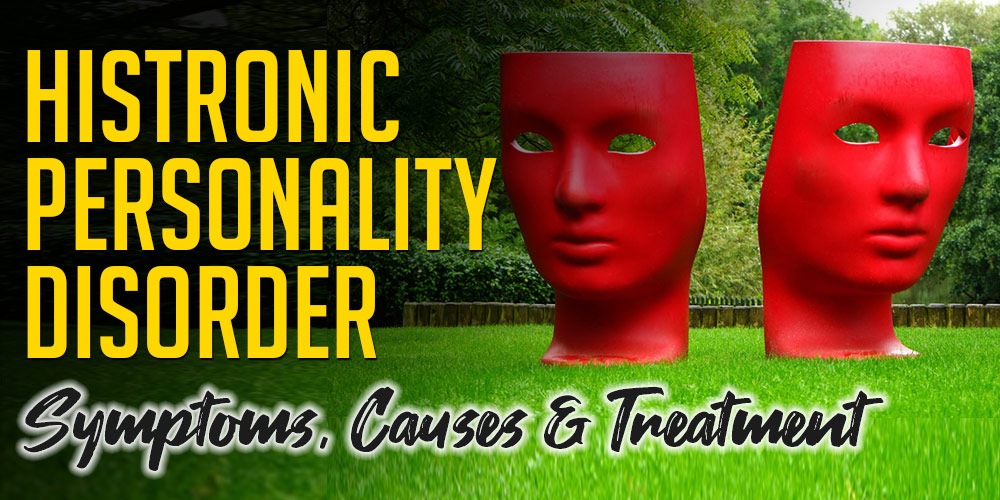
The general public often misunderstands personality disorders. These are complex mental illnesses that might present as quirky or difficult personalities. In many cases, a person suffering from a personality disorder is unable to recognize their own condition even when presented with its evidence. This is especially true in the case of Histrionic Personality Disorder.
An estimated 9 percent of the population deals with some type of personality disorder.
Research suggests that around 2 to 3 percent of people live with histrionic personality disorder, though it’s difficult to know for sure because of the very nature of the condition itself.
As noted above, the condition tends to be ego-syntonic, which means people living with the disorder might see their behavior as normal, and fail to identify or report any symptoms.
In addition, many people with histrionic personality disorder may never seek treatment even though the disorder can lead to significant quality of life and impairment issues.
What is Histrionic Personality Disorder (HPD)?
Histrionic Personality Disorder is associated with psychological disorders referred to as Cluster B personality disorders. This group of disorders tends to display personality types that seem unpredictable, emotional, and dramatic.

People with HPD often have a very chaotic inner-life where they measure their self-esteem on the approval of others. This is more than simply feeling peer-pressure because it can drive attention-seeking behaviors that are self-destructive.
Some of the destructive behaviors associated with HPD include substance abuse, impulsive and unsafe sexual activity, and taking many other unnecessary risks.
Relationships can also be problematic for those with histrionic personality disorder because they may believe they are much more intimately connected to a person than they are in reality. This can lead to habitually unstable relationships, severe anxiety, and depression.
Many people living with HPD actually function quite well in normal society and may even display exceptional people or social skills, except in the case of intimate personal relationships.
However, if anxiety about their place in the world or self-worth escalates, they are likely to act out by manipulating others emotionally, engaging in self-destructive behaviors, and may be at an increased risk for suicidal gestures.
Histrionic Personality Disorder Causes
It’s not entirely clear why some people develop HPD and others do not. Scientists attribute the condition to a combination of genetic and environmental factors.
A person with a family history of personality disorders is more likely to develop this disorder than a person without any medical history of this type of mental health condition.
Environmental factors may include a person who grew up in a household where histrionic personality disorder behaviors were on display and seen as normal.
Additionally, children who were denied positive reinforcement or, in fact, were rewarded with attention for emotional or dramatic behavior can potentially develop HPD tendencies as way to get noticed from adults in their life.
Whatever the cause of histrionic personality disorder, it’s typically not until early adulthood that many of the symptoms will become noticeable.

Histrionic Personality Disorder Symptoms
As discussed, histrionic personality disorder symptoms might appear as personality quirks or someone others may think is simply “socially awkward.” If a person is struggling with this disorder, though, they are very likely dealing with mental and emotional turmoil.
The symptoms may present as being bored easily, acting impulsively and without thought or regard for others, or threatening to harm to themselves.
Common HPD Symptoms include:
- Constantly seeking approval of others
- Dramatic and theatrical public displays or exhibitionism
- Inappropriate sexual behavior or appearance
- Extremely sensitive to criticism
- Regularly crave attention
- Overt, excessive emotions that can change quickly
- Easily influenced by the actions or opinions of others
- Inability to properly gauge the intimacy of relationships
- Poor decision-making abilities
Diagnosing HPD
The Diagnostic and Statistical Manual of Mental Health (DSM 5), sometimes referred to as the “bible of psychiatric conditions,” requires a diagnosis of HPD to include at least five or more symptoms from a list of eight.
Five of the following symptoms are necessary for a diagnosis of Histrionic Personality Disorder:
- A highly suggestible personality, meaning easily influenced by circumstances or others around them that they consider important
- Uncomfortable in settings where they are not the center of attention or the life of the party
- Regularly uses their physical body to draw attention to themselves
- Uses inappropriately provocative or sexual behavior to get attention
- Has the tendency to think relationships are more intimate than they actually are
- Displays outsized expressions of emotion, dramatics and theatricality
- A style of speech that lacks detail and is influenced by those around them
- Exhibits shallow expressions of emotion that shift rapidly

It should be noted that HPD can also coexist with other mental health issues such as anxiety, eating disorders, or addiction and depression. Other personality disorders like narcissistic, borderline, or antisocial might also occur simultaneously.
While getting people that display these symptoms to seek help and accept treatment can be difficult, there are therapeutic approaches that can be effective.
Histrionic Personality Disorder Treatment
Because people with HPD are at a greater risk for severe depression that can affect their ability to hold a job, stay focused on goals, or maintain healthy relationships, medications are sometimes suggested.
Medications like antidepressants or anti-anxiety meds can be effective for related symptoms of depression or anxiety that often accompany histrionic personality disorder, although they don’t treat the disorder directly.
One-on-one therapy and counseling can also help a person examine many of the underlying causes of the disorder and develop skills to better relate to others in a more positive way.
Counseling and therapy might also focus on failed intimate relationships that could be causing depression or anxiety. Cognitive Behavioral Therapy can be effective for exploring the connection between thoughts and emotions, and the role they play in behavior.
For any co-occurring mental health issues, such as a substance use disorder, dual diagnosis treatment may be necessary. It is important that both HPD and substance abuse are addressed because the symptoms of one will only worsen the other condition.
With support, compassion, and help, people struggling with histrionic personality disorder can lead healthy and productive lives.
Related Posts
- Alcohol Dementia Causes, Symptoms and Treatment
Note: Alcohol Dementia goes by many names including, alcohol-related dementia, alcoholic dementia, and alcohol-induced dementia.…
- Alcoholic Neuropathy Symptoms, Causes and Treatment
Excessive alcohol consumption, especially for long-term drinkers, can create a host of difficult health issues.…
- Obsessive Compulsive Personality Disorder / OCD
The term Obsessive Compulsive Disorder / OCD is often used casually in conversation, however, it’s a…
